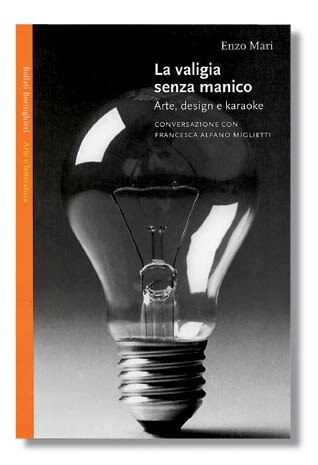La valigia senza manico Arte, design e karaoke Enzo Mari Conversazione con Francesca Alfano Miglietti Bollati Boringhieri, Torino 2004 (pp. 124, € 14,00)
Around thirty years after the book Project and Passion, Enzo Mari has printed a new essay with Bollati Boringhieri entitled The bag with no handle. Art, design and karaoke. The two publications are very similar in size and content, but while the first was a condensed philosophical and project methodology text with an educational tone, the second is a two-way conversation (with Francesca Alfano Miglietti), and the subjects develop with apparent casualness in the interview’s pleasant and fluid rhythm.
One might almost say that this slim volume comes as an easy means of better appreciating the contents of the first book, which was sometimes too condensed and therefore heavy going (especially for younger readers). However Mari does not look for easy approval, and concepts are explained with a certain absoluteness. But if the desire is to produce a work with principles that are also popular, one needs an appropriate linguistic and communicative solution. In this sense the interview formula is efficient as an instrument of critical reflection (today very fashionable in contemporary art). It is a Socratic dialogue technique already admirably adopted by Enzo Mari with the unforgettable poet-critic, and on that occasion able conversationalist, Renato Pedio.
We recall the “conversation with Mari” in Enzo Mari, Models of the Real (Milan, 1988) and the virtual dialogue reconstructed by Pedio in the “prologue to thoughts” in Enzo Mari designer (Bari, 1980). Even though they were the years where cultural drives still smouldered, the intensity and subtlety of the philosophical reasoning remains unparalleled. Since Enzo Mari started his first important text on design themes in 1970 (Purpose of aesthetic research, Edizioni Comunità), he has worked on his reflections on the value of Form, the meaning of Project, the role of the “Project in the real” and Utopia with a Carthusian meticulousness and patience (the reference to the monastery’s amanuensis monk is not accidental).
A lot of water has passed under the bridge since then and if many things have considerably changed, Enzo Mari has not lost his compass, though his “negotiation” with the real has certainly been put to the test. It is therefore interesting to read this kind of monologue in interview form to understand the “state of art” (in the general and specific senses of the term) from Enzo Mari’s point of view. The subtitle’s citation of karaoke is a sign of the updating Mari has been forced to undergo, and which he has come to consider as a metaphor of “seeming” in contemporary reality. Mari confronts us with the fact that we live in a global society where the successful and dominant culture (both in design and architecture along with many other aspects of contemporary art) is that of karaoke.
It is a subculture giving everybody the chance to clumsily “sing” a famous theme of reference without any preparation. As Mari explains, this can be pathetic or touching as long as it means occasional and short performances. But post-modern and global society endlessly multiplies everything: “What I find intolerable,” says Mari, “is when a skyscraper (thousands of skyscrapers) is the karaoke expression of self-styled architects who can manifest their obsessive ignorance and arrogance for tens of thousands of days…” But this book by Mari is rich in other provocative and stimulating observations: “Quality is a relative concept” for who follows a curious and brilliant demonstration. “Abstract painting does not exist”; “a project is good if it induces people to change their behaviour”; “design is the highest form of craft”; “except for some exceptional cases, all industrial production is kitsch”; “the horizon of design is that of art”; “archetypes belong to art, and the paradigm of science is the archetype”; “knowledge is a question of passion”; “the overall archetype of art: the memory of the gods in the idealising tension of the future”; “poetry is a prosthesis like chipped flint stone”: “the language of the society to which I belong is that of kitsch, albeit to the extent of consumer goods… The only thing I can do is ‘negotiate’”; “the concept of liberty outside a concept of order is chaos”.
Mari is without doubt one of the most important living designers and yet many of his colleagues do not tolerate his continual theoretical and cultural contributions on project values and principles. But Mari’s greatness is given by his research into the meaning of “things”, allowing him to offer some fragments of crystallised utopia. In this book one senses that Mari is both strong and tired at the same time: strong with experience that allows him to give a more thoughtful and complete meaning to his studies, but tired of being the cantor of a utopia that seems to belong, as he says, to another age. “Sometimes,” writes Mari, “I feel like I belong to a generation of pioneers, and up to now, through luck or misfortune, I am still alive and I realise I am talking about things that no longer belong to this kind of reality… It is as if I were speaking about the epic that in the real world, beyond ethics and utopia, and who is right or wrong, no longer exists and is totally incomprehensible”.
With regards to pioneering generations, one cannot help noting the striking similarity between Enzo Mari’s thinking and that expressed nearly 100 years ago, in 1908, by another great scourge of the karaoke of his time, Adolf Loos, in his famous pamphlet “Ornament and crime”. Lastly, for whoever was curious to learn the meaning of the book’s title, we refer the readers to this enjoyable discovery in the short introductory text to Mari’s book.
Giampiero Bosoni Architect, teacher of History of design and planning at the Milan Polytechnic


